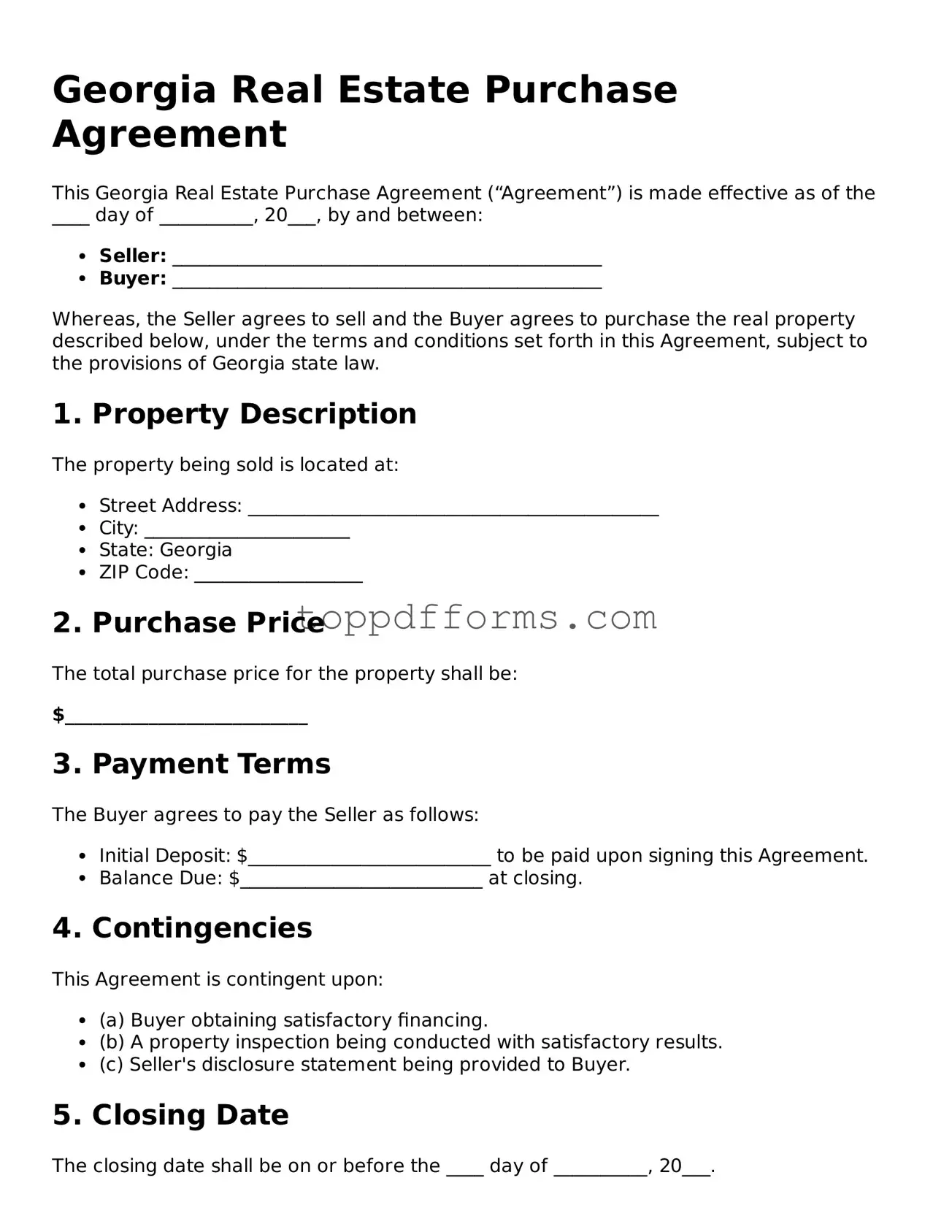Real Estate Purchase Agreement Document for Georgia State
Things You Should Know About This Form
What is a Georgia Real Estate Purchase Agreement?
The Georgia Real Estate Purchase Agreement is a legally binding document that outlines the terms and conditions under which a property is bought and sold in Georgia. It serves as a contract between the buyer and seller, detailing essential information such as the purchase price, closing date, and any contingencies that may apply. This agreement is crucial for ensuring that both parties understand their rights and obligations throughout the transaction process.
What key elements should be included in the agreement?
A comprehensive Georgia Real Estate Purchase Agreement should include several important elements. These typically consist of the names and addresses of both the buyer and seller, a clear description of the property, the agreed-upon purchase price, and the terms of payment. Additionally, it should outline any contingencies, such as financing or inspection conditions, and specify the closing date. Including these details helps prevent misunderstandings and ensures a smoother transaction.
Are there any contingencies I can include in the agreement?
Yes, contingencies are an important part of a Real Estate Purchase Agreement. Common contingencies include financing, which allows the buyer to secure a mortgage before finalizing the sale, and inspection, which gives the buyer the right to have the property professionally inspected. If any issues arise during the inspection, the buyer may negotiate repairs or even withdraw from the agreement without penalty. Other contingencies may involve the sale of the buyer's current home or the appraisal of the property meeting a certain value.
What happens if either party breaches the agreement?
If either party fails to fulfill their obligations as outlined in the agreement, it is considered a breach of contract. In such cases, the non-breaching party has several options. They may seek to enforce the agreement through legal action, potentially resulting in damages awarded for any losses incurred. Alternatively, the parties can negotiate a resolution or agree to terminate the contract. Understanding the potential consequences of a breach can help both parties approach the agreement with care and consideration.
Do I need a real estate attorney to help with the agreement?
PDF Overview
| Fact Name | Description |
|---|---|
| Governing Law | The Georgia Real Estate Purchase Agreement is governed by the laws of the State of Georgia. |
| Parties Involved | The agreement involves at least two parties: the buyer and the seller. |
| Property Description | The form requires a detailed description of the property being sold, including address and legal description. |
| Purchase Price | The total purchase price must be clearly stated in the agreement. |
| Contingencies | Buyers can include contingencies, such as financing or inspection requirements, in the agreement. |
| Closing Date | The agreement specifies a closing date, which is the date when the transaction is finalized. |
Common mistakes
When filling out the Georgia Real Estate Purchase Agreement form, many individuals overlook critical details that can lead to complications down the line. One common mistake is failing to provide accurate property descriptions. The agreement requires a precise identification of the property, including the address and legal description. Omitting or incorrectly stating this information can result in disputes or even the invalidation of the contract.
Another frequent error involves neglecting to specify the terms of the purchase. Buyers and sellers must clearly outline the purchase price, financing details, and any contingencies. Without these essential terms, the agreement may become ambiguous, creating confusion and potential legal issues. Clarity in these terms is crucial for both parties to understand their obligations.
Additionally, many people forget to include necessary signatures and dates. The agreement is not legally binding unless all parties have signed it. Missing signatures can delay the transaction and may require additional paperwork to rectify. Ensuring that all required parties sign and date the document is a vital step in the process.
Lastly, some individuals underestimate the importance of consulting with a real estate professional or attorney. While the form may seem straightforward, the nuances of real estate transactions can be complex. Seeking guidance can help avoid mistakes that could lead to financial loss or legal complications. Taking the time to understand the implications of each section of the agreement is a worthwhile investment.
Other Common State-specific Real Estate Purchase Agreement Forms
Real Estate Sales Contract Example - The agreement presents the purchase price that the buyer will pay for the property.
When engaging in the sale of a motor vehicle in Texas, it is crucial to complete the necessary documentation to protect both the buyer and the seller. A Texas Motor Vehicle Bill of Sale serves as an official record of the transaction, and you can find the required form to facilitate this process through PDF Templates.
Real Estate Sales Contract Form - This agreement may clarify what happens to earnest money.
